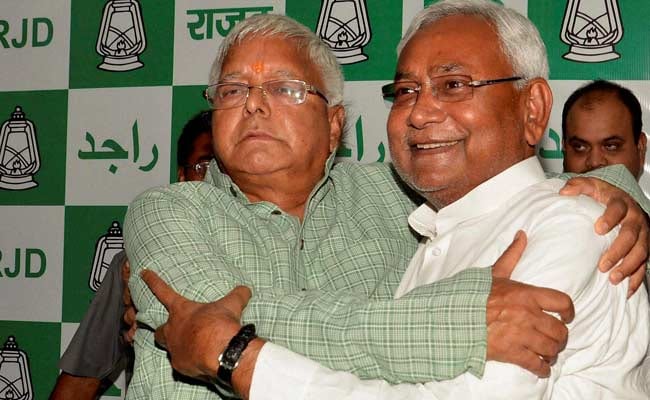
Bihar's Lalu Yadav has decided that his party will not contest the election in Uttar Pradesh (File photo)
- Lalu's youngest daughter married to Mulayam Singh's relative
- Mulayam Singh's Samajwadi Party governs Uttar Pradesh
- Lalu won't field candidates in UP, but his partner, Nitish Kumar, will
Did our AI summary help?
Let us know.
Patna:
Family has trumped politics for Bihar leader Lalu Yadav, who has decided that his party will not contest the election in neighbouring Uttar Pradesh. Sources close to Lalu, as he is known, say that the abstinence is owed to the fact that Lalu's youngest daughter is married into the family of Mulayam Singh Yadav ,whose Samajwadi Party currently governs Uttar Pradesh.
On record, Lalu has said that he did not want to split the vote in Uttar Pradesh that would accrue to "secular forces" or parties other than the BJP.
Lalu's political partner, Bihar Chief Minister Nitish Kumar, feels differently. He is set to field many candidates in the Uttar Pradesh election from his Janata Dal-United or JD(U).
Once the occupants of a rabid political rivalry, Mr Kumar and Lalu contested the Bihar election together in November, which paid off handsomely with Mr Kumar being re-elected for a third consecutive term to head the state. Lalu's party, the RJD, won more seats, but serves as the junior partner in the government.
Mr Kumar plans to campaign extensively in Uttar Pradesh, particularly in the eastern part which borders Bihar. He is there today to support leaders who recently quit the party headed by Mayawati, a formidable heavyweight in the area, who has served four times as the Chief Minister of India's most populous state.
In Uttar Pradesh, where political strategy is rooted in a complicated caste calculus, Mr Kumar, sources say, is keen on winning as large a section as possible of the non-Yadav non-OBC (other backward caste) vote. The same slice of population is key, along with the upper caste vote, to the Congress, which has been reduced to a fringe player in Uttar Pradesh over the years, as also to the BJP.
The state votes next year and its result will be seen as a predictor of who will be elected Prime Minister in 2019. In the last Uttar Pradesh election in 2012, neither Lalu nor Mr Kumar won a single seat.
Uttar Pradesh's 21% Dalit population has been the main support base of Mayawati, though in the general election of 2014, large swathes of it voted for the BJP, whose campaign focused on development and was led by its then presumptive Prime Minister, Narendra Modi. The Yadavs and Muslims are usually loyal to Mulayam Singh Yadav, whose young son, Akhilesh, is Chief Minister. The BJP is popular with the upper castes and non-Yadav backward castes, who are key also to the plans of the Congress and Mr Kumar. The Bihar Chief Minister is reportedly open to an alliance with the Congress.
BJP President Amit Shah, who is handling the party's bid for Uttar Pradesh, has said the Bihar Chief Minister 's plans make his party a "vote katwa" or an outfit committed just to fractioning the vote.
On record, Lalu has said that he did not want to split the vote in Uttar Pradesh that would accrue to "secular forces" or parties other than the BJP.
Lalu's political partner, Bihar Chief Minister Nitish Kumar, feels differently. He is set to field many candidates in the Uttar Pradesh election from his Janata Dal-United or JD(U).
Once the occupants of a rabid political rivalry, Mr Kumar and Lalu contested the Bihar election together in November, which paid off handsomely with Mr Kumar being re-elected for a third consecutive term to head the state. Lalu's party, the RJD, won more seats, but serves as the junior partner in the government.
Mr Kumar plans to campaign extensively in Uttar Pradesh, particularly in the eastern part which borders Bihar. He is there today to support leaders who recently quit the party headed by Mayawati, a formidable heavyweight in the area, who has served four times as the Chief Minister of India's most populous state.
In Uttar Pradesh, where political strategy is rooted in a complicated caste calculus, Mr Kumar, sources say, is keen on winning as large a section as possible of the non-Yadav non-OBC (other backward caste) vote. The same slice of population is key, along with the upper caste vote, to the Congress, which has been reduced to a fringe player in Uttar Pradesh over the years, as also to the BJP.
The state votes next year and its result will be seen as a predictor of who will be elected Prime Minister in 2019. In the last Uttar Pradesh election in 2012, neither Lalu nor Mr Kumar won a single seat.
Uttar Pradesh's 21% Dalit population has been the main support base of Mayawati, though in the general election of 2014, large swathes of it voted for the BJP, whose campaign focused on development and was led by its then presumptive Prime Minister, Narendra Modi. The Yadavs and Muslims are usually loyal to Mulayam Singh Yadav, whose young son, Akhilesh, is Chief Minister. The BJP is popular with the upper castes and non-Yadav backward castes, who are key also to the plans of the Congress and Mr Kumar. The Bihar Chief Minister is reportedly open to an alliance with the Congress.
BJP President Amit Shah, who is handling the party's bid for Uttar Pradesh, has said the Bihar Chief Minister 's plans make his party a "vote katwa" or an outfit committed just to fractioning the vote.
Track Latest News Live on NDTV.com and get news updates from India and around the world

